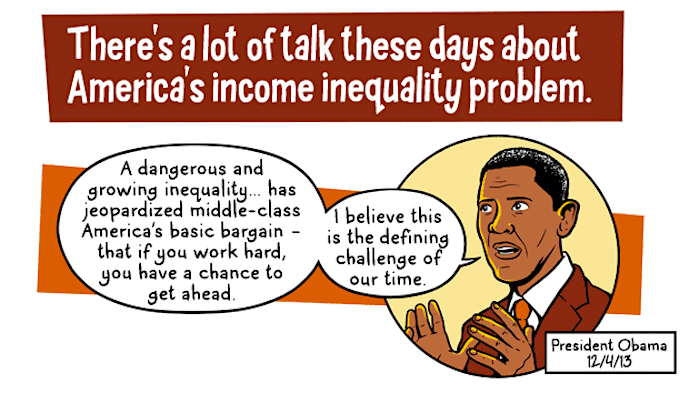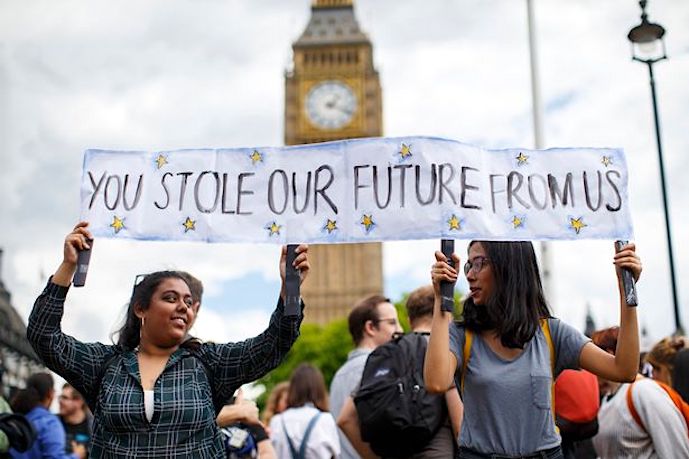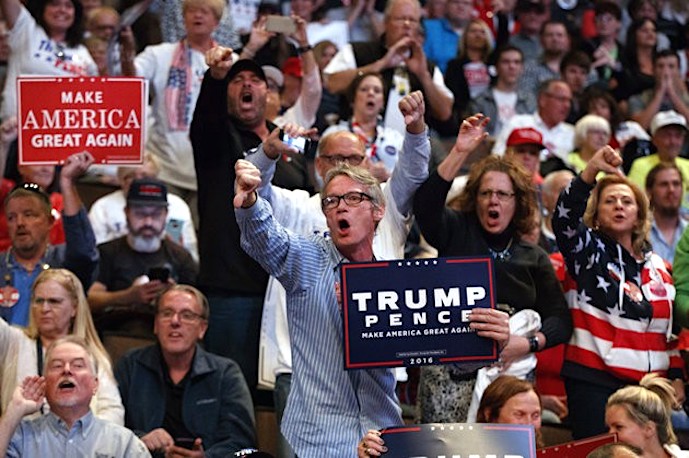
Inequality has been the subject of several pieces on
The Political Sword. They have focussed primarily on income and wealth inequality, which afflicts massive swathes of the world’s peoples, consigning them to constrained lives where poverty, underprivilege, disadvantage, and lack of opportunity has blighted individuals, families, communities, and in some instances, whole nations. Such inequality is divisive, disruptive and destructive to civilized society.
Recently we have seen the ‘inequality syndrome’ play out more strikingly and alarmingly as a metastasizing global malignancy that threatens to invade and destroy the very foundation of the harmonious social order we crave within societies, and more widely across national boundaries. Unless national and international immune systems can counter this cancer’s spread, we are doomed to ongoing discord, conflict, confrontation, warfare, and the death of our cherished institutions.
We don’t need to think back too far to remember Brexit and the reasons for it. And in the US we have witnessed a most unedifying display of the consequences of inequality played out during the long and distressing presidential election campaign.
Inequality is a global cancer that afflicts countless societies and billions of people. Chillingly, the cancer seems out of control. No one has the cure. We feel like the patient who has been told that nothing more can be done.
I will expand on this theme later, but for those who might not have been following the discourse on inequality on
The Political Sword, in April there was
Inequality will be a hot button election issue. Although Bill Shorten tried to make it so, Malcolm Turnbull and his Liberals were having nothing of that, so inequality was no more than a dark shadow in the background. Then in May there was
Trickle down thinking breeds inequality that described standard neoliberal economic dogma that postulates that giving tax cuts to the top end of town will foster investment, grow jobs and increase wages. Although long ago debunked as zombie economics, it remains holy writ to conservatives, and is still being trotted out here and elsewhere.
The recent visit of French economist Thomas Piketty has heightened interest in inequality. In
The Picketty divide Part 1, his basic theory is delineated:
“
Piketty has a basic equation developed from tax data across a number of countries going back over two hundred years:
r > g
That is, the rate of return on capital (r) is greater than the rate of growth of income (g). Throughout the nineteenth century and up to World War I, that greater rate of return led to high levels of inequality, with wealth concentrated at the top. In periods of high inequality, the rich can hold capital up to seven times the value of total national annual income. Thus those with inherited wealth who invest their capital will become even wealthier, and will always outperform those on wages alone.”
Piketty’s views have been widely endorsed by economists, although not by neoliberal thinkers.
One reviewer of his book
Capital in the 21st Century interpreted his thesis as follows: '
…inherited wealth will, on average, “dominate wealth amassed from a lifetime’s labour by a wide margin. Wealth will concentrate to levels incompatible with democracy, let alone social justice. Capitalism, in short, automatically creates levels of inequality that are unsustainable.”'
For those interested in his work there was also
The Piketty divide Part 2 and
Piketty Un-picked.
Inequality has been a life-long interest of Nobel Laureate in economics Joseph Stiglitz, whose views were discussed in
Focus on political ideology: Joseph E Stiglitz. In that piece there was a summary of Stiglitz’ thesis provided by
Project Syndicate, an international not-for-profit newspaper syndicate and association of newspapers that distributes commentaries and analysis. It read:
America likes to think of itself as a land of opportunity, and others view it in much the same light. But, while we can all think of examples of Americans who rose to the top on their own, what really matters are the statistics: to what extent do an individual’s life chances depend on the income and education of his or her parents?
“Nowadays, these numbers show that the American dream is a myth. There is less equality of opportunity in the United States today than there is in Europe – or, indeed, in any advanced industrial country for which there are data.
“This is one of the reasons that America has the highest level of inequality of any of the advanced countries – and its gap with the rest has been widening. In the “recovery” of 2009-2010, the top 1% of US income earners captured 93% of the income growth. Other inequality indicators – like wealth, health, and life expectancy – are as bad or even worse. The clear trend is one of concentration of income and wealth at the top, the hollowing out of the middle, and increasing poverty at the bottom.
“It would be one thing if the high incomes of those at the top were the result of greater contributions to society, but the Great Recession showed otherwise: even bankers who had led the global economy, as well as their own firms, to the brink of ruin, received outsize bonuses.”
This brings me to the main thrust of this piece. Feelings of unfairness and inequality are corrosive. We see this the world over.
Take Brexit. There are many reasons why UK voters voted for Brexit, but prominent among them was opposition to immigration. Many British folk voted for leaving the European Union because they felt alienated from their own communities because of the influx of migrants from foreign countries. Some said they hardly recognized their local community when they walked down their main street because there were so many foreigners on the streets and in business there. They were angry that these people were taking their jobs, and more poignantly taking away their British way of life. They felt they were being left behind in their own country. Anguish is the genesis of their sense of dispossession and their feelings of inequality. Their anger persists to this day. The recent UK High Court decision that only parliament can trigger the activation of Article 50 that initiates exit from the European Union, has re-activated the hope among Brexit opponents that exit might be thwarted. Brexit supporters are furious.

All across Europe, in America, in Asia, and even in our own country, there are those who strongly resent asylum seekers and even invited immigrants arriving at their country’s borders. Pauline Hanson was unapologetic when she stridently asserted:
“Refugees are not welcome here”. No doubt the quarter of a million who voted her in feel the same.
The resentment extends even to benign communities. Last week, citizens of Eltham, an outer suburb of Melbourne that is largely middle class, joined together to welcome government-invited Syrian refugees into spare accommodation in a local aged care facility. They initiated a ‘butterfly’ movement, festooning fences with welcoming words. To their surprise and disappointment, their peaceful suburb was invaded at the weekend by a group of protestors angry at the welcome being extended to these distressed refugees from that grotesquely war-torn nation. This vignette is symptomatic of the invasive cancer that can spread even into peaceful communities when resentful protestors feel that immigrants are getting an unfair share of this country’s resources and welfare. The Good Samaritan came out to assist the traveller, beaten and robbed and left for dead, while the Priest and the Levite, not satisfied with simply ignoring him, reviled him for good measure.
Resentment and anger are cancerous. The cancer emerges when there is a threat to what people and communities have come to value: security, a decent job, a family home, a sense of belonging, the respect of peers, and societal harmony.
The US presidential election has exposed even more starkly the ugly side of human nature. Donald Trump has tapped into the intense feelings of inequality, dispossession, disadvantage and despair that many feel as they see their jobs going overseas, or to illegal Mexican migrants, or to Muslim refugees. Many white men in America’s rust belt have lost their once-secure jobs; with globalisation manufacturing has moved from their home towns to overseas plants. Automation and rapidly changing technology has made many jobs redundant. They feel hopeless. They harbour deep resentment that the America that was once great is no longer so, and they have been the losers.
It is not surprising then, when Trump calculatingly stirs up their resentment and promises to ‘Make America Great Again’, they believe he can, and that life would be great for them again as jobs return and prosperity abounds! They think their feelings of disadvantage and inequality would magically evaporate.

Trump has taken an isolationist, protectionist stance. He says he will tear up trade deals that he believes disadvantage America, he will build a wall to keep Mexicans out, and he will put a stop to Muslim immigration. Because he believes global warming is a hoax, he boasts that he will scrap America’s commitment to the UN climate change initiatives, and will reinstate coal as America’s prime energy source. In classic neoliberal fashion, he promises that 'massive tax cuts' will restore lost jobs. All of these ideas are anathema to clear-thinking economists, but his followers believe his every word, his every promise. He backs his promises by referring to his business success, and on the international front by stating his intention to create a supercharged military that will ensure America's global superiority. What he says appeals and gives them hope. He is their messiah, and their messianic hope cannot be extinguished. Facts and logic are irrelevant; blind faith, akin to religious fervour, is their bulwark.
There is no point in denouncing their edifice of beliefs. They are built brick by brick out of feelings of disenfranchisement, alienation, dispossession, poverty, despair, and fear. They believe that the political establishment has no concern for them, no interest in their plight, no remedy for their desperate condition. They believe, and Trump reinforces this belief every day, that the political establishment is incompetent, and like its elite backers and the media, is corrupt and self-serving. Many agree with the general thrust of his thesis, but few believe that he has the understanding, or the skill or capacity to change the establishment for the better. Ironically, his background is as a member of a powerful wealthy elite that flouts the law and uses it for personal advantage. He is a billionaire businessman who has paid no tax for a decade, and who refuses to reveal any tax details.
His singular immorality though is that in pursuit of the presidency he is deliberately amplifying the feelings of inequality and dispossession his supporters feel so intensely, and promising what he would never be able to deliver.
Inequality is much broader than wealth and income equality. It affects all facets of life. As celebrated epidemiologist Michael Marmot has shown,
health inequality parallels income inequality. Those lowest on the social scale have the worst health. Yet Trump says he will abolish ‘Obamacare’, even although it has afforded health insurance for millions of poor people who previously could not afford it.
Because we now live in a global society, we are able to see what others have, here and overseas. When individuals see others prospering in peaceful societies while they languish in poverty, when they endure conflict, war, destruction and death, they feel unequal and deeply resent it. Even if those in war-torn countries were gifted a good income, their suffering and terror would continue, and they would still seek a safer place to live and bring up their children.
Inequality is not restricted to wealth and income. Just as distressing are inequalities in job opportunities, rewarding employment and decent housing; inequalities in education, healthcare, life expectancy and justice; and inequalities in the enjoyment of a productive and peaceful family life free of political, religious and racial persecution, xenophobia and hatred. These inequalities are all sources of resentment and anger, and in extreme situations, discord, conflict and social disruption.
Every day we see the malignant cancer of inequality spreading throughout the world. It has invaded the UK, Europe, the Middle East, Asia, the US and its presidential election, and even our own country as xenophobic forces seek to shape our politics and our society. The cancer of inequality has metastasized globally. Is it beyond cure? Is there the possibility of a remission? Is it possible even to excise a local metastasis?
Every day there is one commentator or another who highlights inequality as a major issue in society. Progressives echo this, but conservatives never mention it. Equality is not part of their DNA. Indeed, they regard inequality as the acceptable norm. Their policies and actions worsen inequality. They do not see its malignancy, nor do they see that it is spreading inexorably, here and elsewhere. They have no cure, because to them it’s insignificant and inconsequential, a benign condition not worthy of a politician’s attention.
When conservatives are society’s physicians, expect no diagnosis of the cancer of inequality; expect no remediation.
Current rating: 0.4 / 5 | Rated 14 times